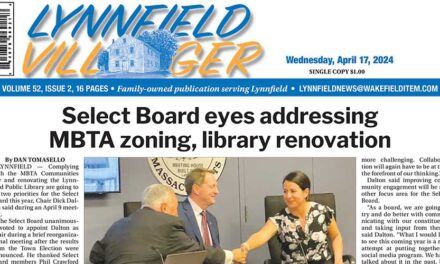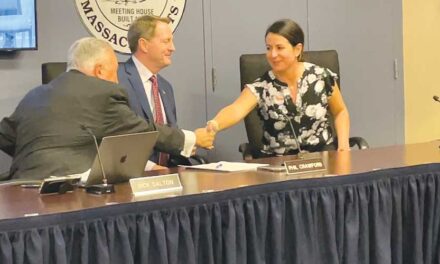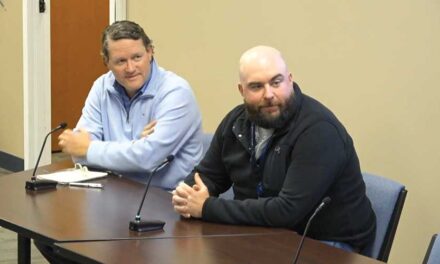Published in the September 19, 2018 edition
By DAN TOMASELLO
LYNNFIELD — The next three fiscal years are going to be challenging, Town Administrator Rob Dolan told the Board of Selectmen on Sept. 12.
Dolan said the selectmen established a goal asking the TA to present a “three-year financial forecast for the town of Lynnfield.” He compiled the report with the assistance of Town Accountant Julie McCarthy.
“We are three months into fiscal year 2019 and we are already looking at FY’22,” said Dolan. “I want to be clear what we are projecting are educated assumptions from previous trends and our collective expertise in our field.”
Dolan said the budget forecast is “invaluable in identifying key areas that the town needs to focus on.”
“Universally, those are rising insurance costs, retirement assessments and collective bargaining agreements,” said Dolan. “(The budget forecast) also helps the town plan its capital budget, debt service and its long-term sustainability and bond rating.”
Budget drivers
Dolan noted the vast majority of the town budget is funded by property taxes, and revenue generated from MarketStreet Lynnfield funds 7.3 percent of the budget. He said the new growth generated from MarketStreet will continue declining over the next three fiscal years.
“The town has experienced historic new growth over the past eight years,” said Dolan. “The new growth is gone. It’s recommended by the town’s assessor that we enter a period of transition to wean off the new revenue and new growth MarketStreet provided and move towards a more sustainable model of new growth that we are estimating at $400,000 per year.”
Dolan noted the School Department has been averaging 4 percent budget increases over the past decade.
“We all know that money doesn’t necessarily equate to outstanding education in every case,” said Dolan. “But the Lynnfield Public Schools has been able to invest incredible amounts of money to limit class size, expand opportunities for all students, (and) provide the type of support all students need not only in terms of curriculum but personal health and well-being. That is incredibly important.”
Dolan said the school district and town have been able to retain high quality employees because of “competitive collective bargaining agreements.” He said the town “has invested more in its infrastructure over the last several years than it has done in its history.”
The TA said the creation of the Stabilization Fund will help protect the town during challenging economic times. He also said the creation of the Other Post-Employment Benefits (OPEB) Fund will benefit the town now and in the future.
“Although it’s never enough, the investment in OPEB is certainly better than most (communities),” said Dolan.
Dolan said the town’s practice of limiting the use of one-time revenues to fund operating expenses is positive.
“We have not had to use the credit card or tax return to pay the mortgage,” said Dolan.
In addition to relying on property taxes and local receipts, Dolan said the town relies on state aid.
“Although the state has seen surpluses, municipalities have not seen the benefit of those surpluses,” said Dolan. “In this fiscal year, we are only seeing a 1.66 percent increase in local aid. That’s about $89,000 for the whole town. That doesn’t even pay for one teacher with benefits. We have become reliant on our own means to survive.”
With the decline in new growth, state aid being flat and municipal budget increases capped at the 2.5 percent tax levy limit, Dolan said the town is estimating receiving $1.2 million in new revenue annually.
“We are estimating a 2 percent increase in local aid, steady revenues and taxes and $400,000 in new growth,” said Dolan. “We are looking at a 2 percent increase in local receipts, which is excise taxes, interest on taxes, fees, rentals and anything outside our usual forms of revenue generation. It’s critically important to have conservative revenue estimates so you don’t find yourself spending more than you are bringing in.”
Dolan hopes the economy will remain strong.
“The state relies on its revenue through the capital gains tax,” said Dolan. “With a strong market, taxes come in and capital gains come in. If there is any major shift in the market, that then turns into a major problem for the Commonwealth of Massachusetts.”
Collective bargaining changes eyed
Dolan is estimating a 2.5 percent annual increase for general government, which will be spent on town employees.
“Collective bargaining agreements for all unions expire in June,” said Dolan. “So this is a critical time to be fair with employees but at the same time recognize what we are projecting. We have to have collective bargaining agreements that allow us to not only be fair to employees but provide services to taxpayers.”
Dolan noted local unions have received a 2.5 percent increase in pay each year over the last three fiscal years.
“As we begin collective bargaining, revenues clearly show that is going to have to change in order to maintain staffing levels which are already adequate and not excessive,” said Dolan.
Dolan said public safety is looking at an annual increase of 3.5 percent over the next three fiscal years. He said collective bargaining agreements for public safety employees are “more complex” than other town personnel.
According to Dolan, the DPW is looking at an annual increase of 3 percent increase the next three fiscal years. He said the library is looking at an annual increase of 3 percent as well.
Dolan said school costs “are going to be a driver” in future fiscal years.
“We averaged 4 percent increases for the public schools over the last decade,” said Dolan. “That is well-invested and outstanding, but it is high compared to our peers. That doesn’t mean we are comparing ourselves to our peers, but a 4 percent increase for the schools at this point is almost the entire amount of new taxation we bring in for the whole town. I am not making judgments in terms of where we are going because there are options, but the fact is if you are spending the entire amount of money you are bringing in on one department, you need something else to rise to cover the other fixed costs particularly pension liabilities and health insurance. That other thing, which was new growth, is not there anymore or has been spent.”
Dolan said the growing traction among state lawmakers to overhaul the Chapter 70 education funding formula would benefit Lynnfield Public Schools.
“Any increase really helps,” said Dolan.
Dolan said the challenge moving forward is striking a balance between investing in the town’s schools and meeting other town needs. He said the town is looking at a 4 percent annual increase in health insurance costs and an annual increase of 9 percent for pension liability costs.
“These are things we don’t control,” said Dolan.
Dolan noted the town “has an incredibly positive debt position moving forward.”
“We have to decide whether we want to fill that with new debt or we could use that to lower our operating costs and lower our debt position,” said Dolan.
Dolan said “responsibly underestimating revenues” will ensure there is Free Cash, which in turn will give the town flexibility.
Selectmen reaction
Selectman Phil Crawford commended Dolan for giving a thorough presentation.
“Our collective bargaining agreements are ending in June, and I think it’s critical for the next three years that we get that adjustment in the bargaining agreements right to go along with the reduction in new growth,” said Crawford. “This will be my 13th budget since I have been on the Finance Committee and Board of Selectmen, and I have seen the whole gamut of pre-recession, recession and post-recession. The unions were agreeable when the recession came along and took zero or minimal increases. And once the money came in from MarketStreet, we gave them a 2.5 percent increase per year across the board. That obviously has to be adjusted the next go around.”
Crawford said “there needs to be a buy-in from all the unions because that is the only way we will be able to keep the status quo.”
“I would agree,” said Dolan.
Selectman Chris Barrett said the three-year budget forecast will help local officials and department heads make tough decisions in the coming months and years.
Selectmen Chairman Dick Dalton thanked Dolan and Town Accountant Julie McCarthy for spending “countless hours” working on the presentation.




